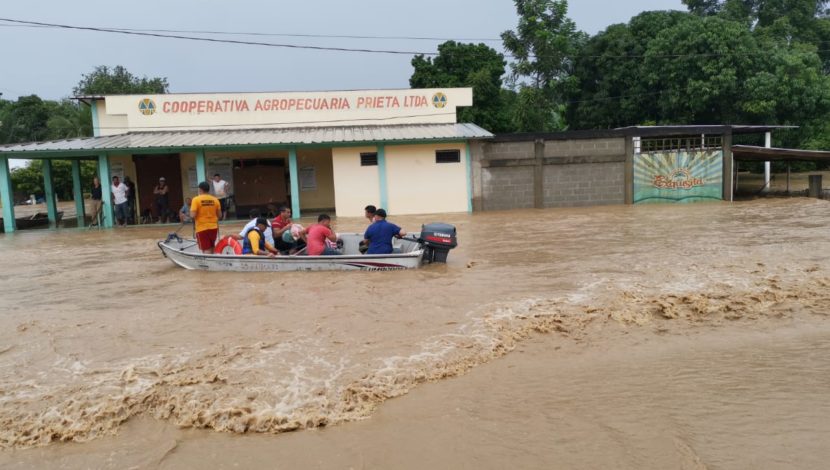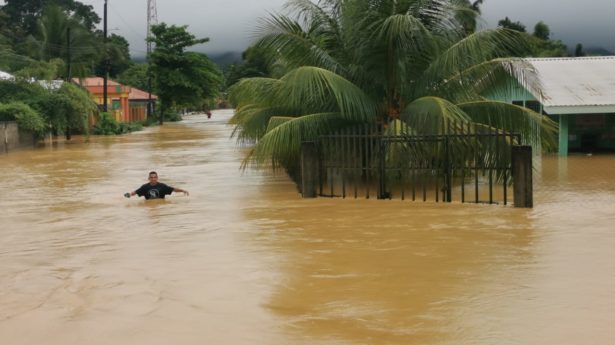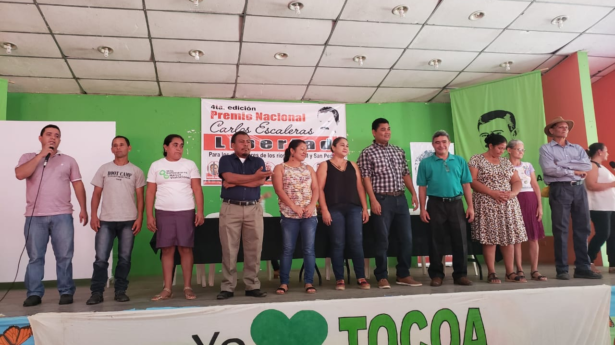The Unitarian Universalist Service Committee advances human rights through grassroots collaborations.
In Wake of Hurricanes Eta and Iota, “Only The People Can Save the People”

By UUSC Staff on November 18, 2020
Two massive Category 4 hurricanes have struck Central America in a two-week period, layering devastation on top of the ongoing COVID-19 pandemic, violence, and a political crisis abetted by U.S. actions. The first storm, Hurricane Eta, made landfall on November 3, causing levels of destruction not seen since Hurricane Mitch hit the region in 1998. In the small hours of Tuesday, November 17, Hurricane Iota followed in its path. These one in a thousand year events are a dire warning of the acceleration of the climate crisis. It will likely take decades for these countries to recover from the catastrophic combined impacts of these storms at a cost of several billions of dollars.
UUSC’s President and CEO Rev. Mary Katherine Morn issued the following statement in response:
“Once again, we can see the power of global and people-to-people solidarity in response to crises where governments have failed to provide adequate relief. In recent days, our contacts in Honduras have shared stories of Indigenous peoples, Garifuna people, and many other Hondurans providing boats for evacuation and life-saving supplies to their neighbors. As our partners in Radio Progreso put it in a recent communiqué, “there is a reason that the common refrain of the last few days has been ‘only the people can save the people.’”
These back-to-back storms put in sharp relief the inhumanity of current U.S. policy in the region. U.S. authorities right now are trying to deport 50,000 Hondurans to a country facing humanitarian catastrophe, while also blocking nearly all asylum-seekers at the border. Many thousands more are likely to be displaced by these storms. Our leaders must respond, not by attacking the survivors, but by understanding the reasons people are forced to leave their homes in the first place: the compounding impacts of climate-induced disasters, violence, and political corruption.
This perfect storm of political oppression, cruel immigration policies, escalating climate crisis, global pandemic, and government indifference create stories that must be heard. The brave acts of individuals facing their own barriers to life and human rights should not be the only hope for their communities.”
Honduras, Guatemala, and Nicaragua have all been catastrophically impacted by Eta and Iota, and all face immense challenges in the storms’ wake due not only to lost housing and displaced people but to looming hunger due to crop loss and outbreaks of dengue, chikungunya and COVID-19. These are precisely the conditions that drive people to migrate, and which are considered within the international protocols protecting refugees. The global community must recognize and uphold these human rights values in order to avoid a much larger humanitarian disaster in the coming months.
One concrete and immediate step that the United States government can take is to designate the impacted countries for Temporary Protected Status (TPS): a program that shields immigrants from being deported to places currently in the midst of humanitarian crisis. Honduras was originally granted TPS in 1999 due to the similar impacts of Hurricane Mitch. The close parallels between this earlier disaster and the present catastrophe underscore the cruelty of withholding TPS at this crucial moment. In addition to these urgent measures, we must also work towards longer-term solutions that incorporate international cooperation to address the root causes of the region’s worsening refugee crisis.
UUSC partners with grassroots communities providing equitable recovery in the wake of disasters including the impacts of COVID-19. We are advancing migrant rights at the national and international level while addressing long-term solutions to the crisis of climate displacement.
Photo Credit: FSAR (Fundación San Alonso Rodriguéz)

